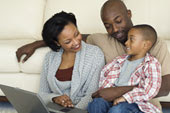
Both parents listening to their son.
1. Listening
When the underlying cause of anger is not determine, there can be severe consequences. Parents you must listen to your child and see where the anger is coming from. Children can sometimes just explode because of underlying issues that have never been discussed or addressed. There could be numerous reasons that children have anger such as divorce, low self-esteem, frustrations of not having any control over their life, feelings of betrayal or being misunderstood. We all want some control over our life to some degree. Possibly your child has had problems with peers at school. Below is a video regarding peer pressure.
2. Talking About It.
Suggest to your child to count to 10 when he/she gets angry. Once you have determined the cause of the anger, talk about it. When your child can talk about it, it is no longer pent-up inside of him/her. It is important to keep the line of communication open between you and your child. Let your child know that he/she is entitled to their feelings. Discuss their feeling with them. For example if your child feels anger because of your divorce, discuss those feelings with them. They may be fearful that you may no longer love them or fear you may some day divorce them. Some children may feel the divorce is beyond their control and they want things to be like they used to be before the divorce. Above all, let them know that you still love them. Sometimes your child may not be able to talk to you, but will talk to a relative.

Parent and children talking
3. Professional Help.
If you have talked until you are blue in the face and the anger does not seem to get resolved, but only seems to get worse, you may want to get professional help. Sometimes that third party intervention by a professional may be needed. Sometimes possibly therapy or group sessions. Children sometimes will talk in groups with others around their age much quicker than they will to you. Children often are drawn to their peer group. Below is a video of teens helping teens.

Psychologist shaking hands with young boy
4. Deep Breathing Physical activities.
Talk to your child at a time when he/she is not angry and discuss deep breathing techniques. That is something that is free,does not cost a cent, and can have a calming effect on your child. Sometimes physical activities such as basketball, track, gymnastics, volleyball, swimming, or even soccer will help children exert some of that energy as oppose to putting that energy into their anger. Below is a gymnastic video.
4. Unacceptable Behaviors.
While it is okay for children to feel anger, let them know it is unacceptable to hit, kick, or hurt another verbally or physically because they are angry. Words can hurt or destroy another. Let your child know there is know benefit for this type of behavior when angry. Let your child know there are other ways to deal with anger.

Boy preparing to fight


2 comments:
You did great job... I like your blog... thanks for sharing.
personalised baby blankets
Thanks Julian. I am glad that you like it. All praises to God.
Post a Comment